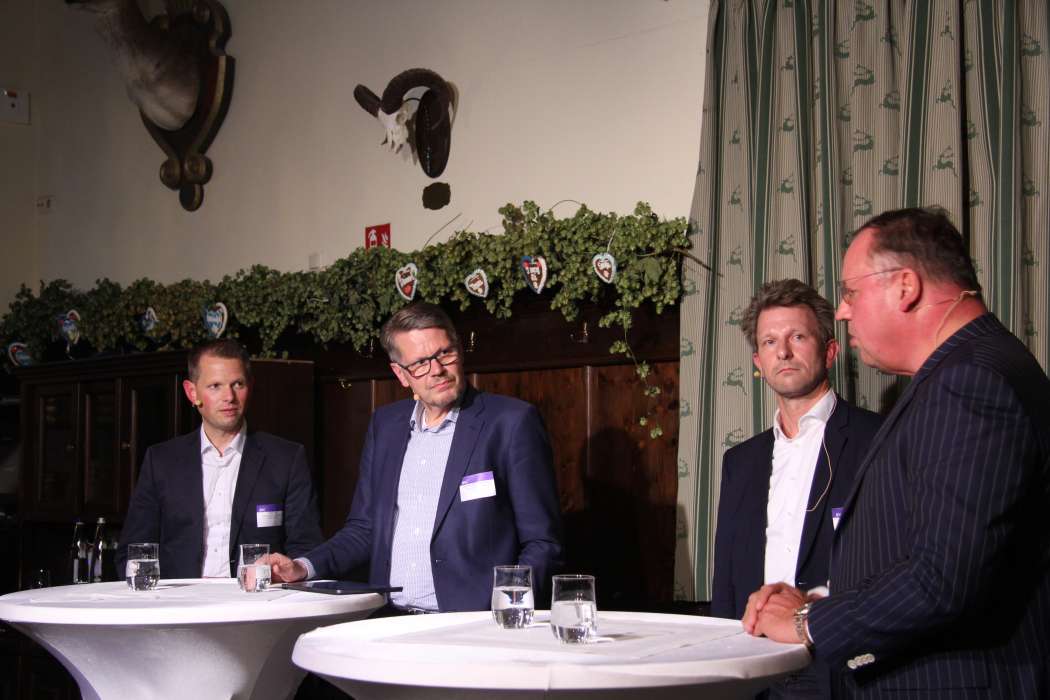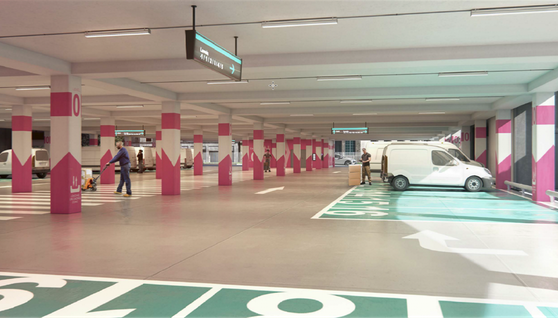URBAN LOGISTICS: A U-TURN IS NEEDED
In a discussion on the BVL’s topic of logistics real estate, experts complained about inflexible building laws and the resulting delays.

To ensure that the population in urban areas can continue to be supplied with goods reliably and sustainably in the future, retail companies, urban planners, developers and public authorities need to rethink some of their ideas. This was the statement from a hybrid retail event held by the logistics real estate program of the German Logistics Association (BVL) on October 13 in Munich.
Four experts from the areas of retail, urban planning, mall operation and commercial real estate development explained in an open discussion how the field of urban logistics must develop in order to achieve both climate policy and urban planning goals as well as the successful transformation of the retail sector.
Logistics Networks are reaching their limits
According to the German E-Commerce and Distance Selling Trade Association, the Coronavirus pandemic helped e-commerce grow by 9.2% in the first half of 2020. At the same time, logistics service provider networks had reached their limits and the expansion of the logistics infrastructure was stagnating.
“Since the start of the pandemic, it has become even more difficult than before to arrange appointments for new projects with the authorities –not to mention getting approvals,” said Francisco J. Bähr, Managing Partner of the developer Four Parx.

Project durations were extended by months in some cases, a point that was emphasized by Olaf Ley, Investment / Asset Management Director for mall operator Unibail-Rodamco-West eld Germany (URW). According to the URW representative, all parties involved need to step up the pace – and also network and cooperate better. The company operates 23 shopping malls across Germany.
Cooperation between e-commerce and in-store trade
For Ley, cooperation between in-store retail and e-commerce specialists is also one of the key factors when it comes to the retail world repositioning itself as a whole – an omnichannel strategy. He cited the Connected Retail project between URW and Zalando as an example. Among other things, this involves stores in malls sending goods from their stores or local warehouses that customers previously ordered on the online fashion platform Zalando.

NEW BUILD: LOGISTICS COMPLEX FOR WOOLWORTH IS FAST-TRACKED
Ley considers a large number of existing malls with large unloading zones for trucks and vans to be suitable for establishing logistics micro-hubs.
Mario Flammann, Managing Director at Pesch Partner Architekten Stadtplaner and co-author of the Stuttgart Chamber of Industry and Commerce’s study entitled “City Logistics Rethought”, also considers the revitalization of derelict retail and industrial sites for logistics and the functional expansion of existing retail buildings for the storage of goods to be a sensible idea since “we have to be careful with land consumption.”
Thinking about urban logistics at an early stage
In his opinion, the competition for space and use in the urban area can only be eliminated through integrated, well thought-out solutions. Companies, planners and politicians are called upon to consider the broad topic of urban logistics in planning processes at an early stage and to facilitate innovative solutions. In particular, this applies to the development of new urban districts.

URBAN LOGISTICS: UNDERGROUND SMART CITY LOOP TAKES SHAPE
City logistics expert Bähr called for more multifunctional real estate to be built in cities. “We must put an end to these bans on thinking. A property with logistics in the basement, retail on the first floor, offices on the second floor and apartments on the floors above makes perfect sense. But in terms of building law, such a project is still a massive problem,” he said.
Moderator Raimund Paetzmann, Vice President of Corporate Real Estate at Zalando and spokesman for the Retail/E- Commerce focus group in this topic area, argued along the same lines: “We now need to develop an idea of what the city and retail will look like in ten years, and then plan backwards from there.”
Construction expert Bähr used the example of a parking lot to explain that even small changes to new buildings can open up many options for logistics service providers. If the first floor was planned to be three meters high instead of two meters, then CEP service providers could drive in with vans at night and unload packages quietly. In general, the Dreieich-based developer urges politicians and the authorities to quickly introduce time windows for urban supply and distribution – and to also think more seriously than before about the issue of reducing carbon dioxide.
“In my opinion, we need to supply the city in a carbon dioxide-neutral way in as little as five years,” he said.
The panelists unanimously emphasized that communities don’t give enough thought to the topic of urban logistics – and rarely dare to break new ground. Bähr stuck up for the Hamburg senate. The latter is interested in conducting a feasibility study on the supply and distribution of the Hanseatic city with the help of a conveyor system in a tunnel. Four Parx commissioned the Smart City Loop company to conduct the study.
540,000 Fewer Vans
According to Bähr, the Senate’s attention was primarily drawn to the fact that this new supply system could replace 540,000 trips per year across a 24-hour/300-day operation. Four Parx say this translates into a saving of over 10,000 tons of carbon dioxide per year.
Retail expert Ley advised logistics professionals, investors and developers not to wait until everyone in cities is convinced by an innovative retail or logistics project:
“Our industry needs to score points with creative proposals and plans whilst also networking even better with each other – this is how we can also develop concepts that will hopefully be approved more quickly with more support from communities.”